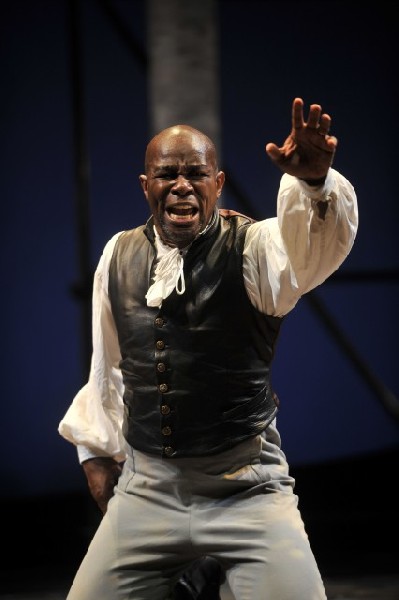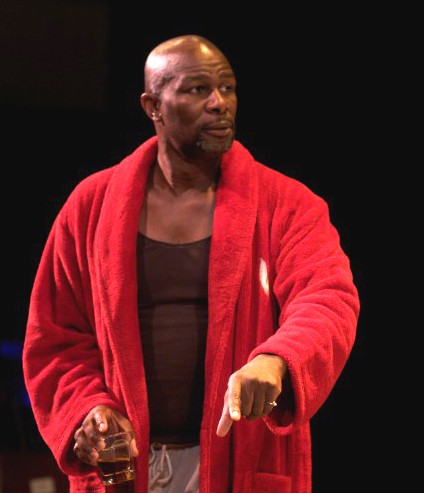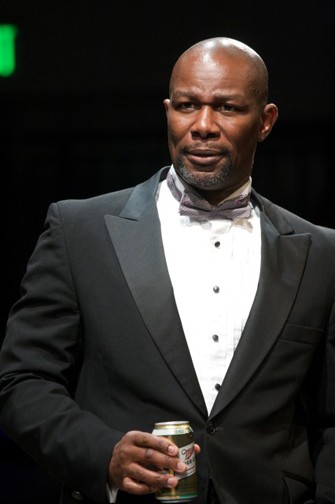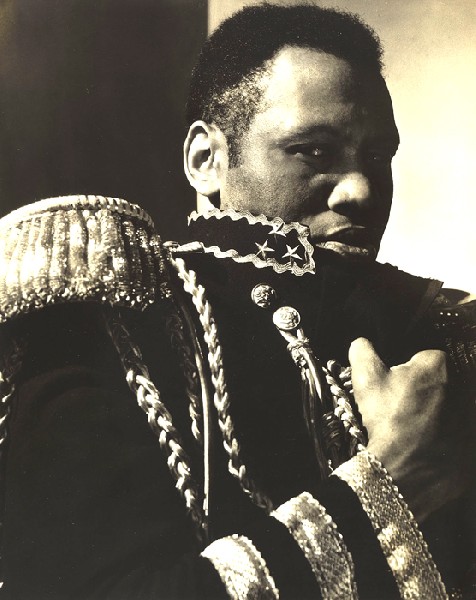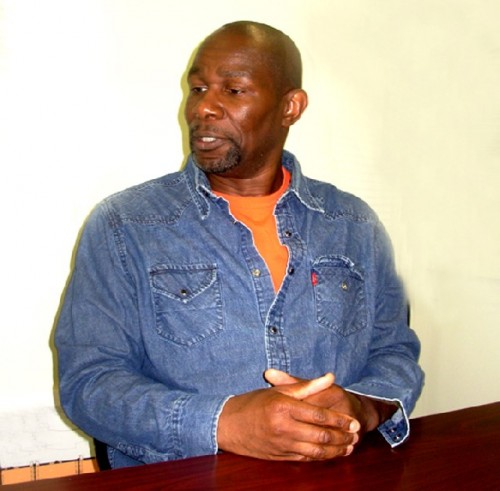John Douglas Thompson as The Emperor Jones
Rave New York Times Review at Irish Repertory Theatre
By: Charles Giuliano - Sep 03, 2009
From October 7 through November 29 John Douglas Thompson will portray "The Emperor Jones," the 1920 play by Eugene O'Neill, at the Irish Repertory Theatre (132 West 22nd Street). The drama of the rise and fall of the dictator of a Banana Republic was first performed with the Provincetown Players starring the foremost African American actor of that era, Charles Gilpin. When there was a falling out with O'Neill he was replaced by Paul Robeson who went on to star in the 1933 film.
We discussed the new project recently when we encountered Thompson on the campus of Shakespeare & Company. This season he has performed "Othello" a repeat of last year's superb production. He has also been one of three actors appearing in an early (1985) play "The Dreamer Examines His Pillow" by Oscar winner John Patrick Shanley. "Dreamer" has been widely reviewed as one of the best productions and casts of the current season.
Berkshire audiences have come to appreciate Thompson as one of our finest resident artists. He has been appointed to the board of S&Co. A return next season in another Shakespeare play is likely to occur.
We were in the lobby before another play so there was no time to discuss in depth his role in the rarely performed "Emperor Jones." I had previously talked with him about Othello. We agreed to a phone interview about "Emperor Jones" "Dreamer" and, inevitably, issues of race including the concept of "color blind" casting. The S&Co. play that we saw recently, a truly hilarious production of "Twelfth Night," included several African American actors.
An interview with Thompson, dialogue, conversation, morphs into an argument and wrestling match. He has sharply focused ideas. Being of a certain age I am rather set in my ways. But our exchanges are straight, sincere, patient and warm. There is a steep learning curve. One senses his frustration when answering inevitable but annoying questions.
Last summer when "Emperor Jones" was under discussion he conveyed fear of taking on such a formidable role in a rarely produced O'Neill play. I reminded him of that as an opener. But he quickly threw me off the scent. "I may have led you down the wrong path with that" he said. "Whenever an actor takes on a role there is the process of traveling into that undiscovered country." From which Shakespeare said "No traveler returns" I reminded him. "There is a process of discovery. First, with the character and then moving into the jungle of the play. There is a level of anxiety whenever you take on a new role. But that process alleviates through the first week of a play. You settle into another level of understanding the character."
Thompson commented that "It hasn't been done in New York for a long time. Not a standard production. It is a challenge to take on the mantle of O'Neill's great work. It is reflective of the man's humanity. It belongs to all of us. I see Brutus Jones not as a black man but as every man. It is about the subconscious of man."
Written in 1920 much of the language of the play, the racial slurs, are tough on a contemporary ear. In that sense is the play a dated period piece? Will that language be toned down in this production ? "We will be faithful to the language" he said. "But just like 'Othello' this is not a play about race. That is beyond my concern. Race is not really a concern of mine. We are not hitting the audience over the head with race. There is a bigger field to perform in. If you focus just on race you miss 90% of the story. This is more about the desperation of a ruler. It is about what the Emperor Jones has done and how he is punished. It is not about black or white. It could be red, brown, or any color and race. It is not a black story. It is about what is happening all over the world."
In researching the play Thompson learned that when it was written O'Neill was reading the works of Carl Jung. In the news at the time there was the story of the Haitian, Jean Vilbrun Guillaume Sam, President from March 4 to July 27, 1915, who was captured and hacked up by rebels. To restore order Haiti was invaded by the US.
At the end of the play, when his regime crumbles, Jones is spooked and delusional when he retreats to the jungle. To understand how O'Neill wrote about this Thompson is currently reading deeply into Jung. It is the kind of meticulous work he undertakes to develop a role.
Diverting back to the subject of race in the roles he performs Thompson conveyed his frustration. "With 'Othello' I work so hard to explain it as a love story so that race doesn't topple it over. To just focus on race is so myopic. You are not seeing all of the wonderful stuff that Shakespeare put into the play. In developing 'Emperor Jones' right now it is in my mind and not yet my body. I am reading Jung and researching Jean Vilbrun Guillaume Sam. O'Neill is informing you of so much more. When you bring up race it is so narrow and uninteresting. There is a hell of a lot more there than race."
But isn't it inevitable that audiences and critics will focus on race. "I expect it but I try to play it down. I understand that writers are trained to push the hot buttons of issues. But I want to take you down the road less traveled where there is the real gold. There is a broader vision to work with. Earlier on I focused on race as well as other things in the story that are not so race dependent. Race is always so apparent. It shows in how you look. It is external and easily seen. But it is on the surface. What I am interested in is what is on the inside."
This led to the topic of color blind casting. Or what happens when for centuries white actors, like Laurence Olivier and Orson Welles, played "Othello." Is it the same process when a black actor performs "Hamlet?" Once again I asked about the feud between August Wilson and Robert Brustein. Wilson, who wrote plays for all black casts railed against color blind casting while Brustein, for whom Thompson worked at American Repertory Theatre, advocated it.
"It's not just about African American actors, but Mexican American, or Asian American" he said. "As long as we are performing a play in the same context of language there is the potential to see the work. It relates to the community we live in. I live in Brooklyn and within three blocks of my home every day I encounter all of the races of the world. This is the world we live in. It is about human potential. In that regard (color blind casting) I vote yes to that."
Once again I reminded him that he had not mentioned August Wilson. He has seen all of his plays. It was by seeing a Wilson play at Yale, somewhat by accident, that he was inspired to take up a life in theatre. I pressed for an answer. "They (Wilson and Brustein) are both right. But I propose a third idea. Non traditional casting is great. But we should also have Latin American, Asian American, African American companies telling their stories and relating to their cultures. It brings us closer and we get to understand each other. It is the next step for humanity. And it is why I have given up on going directly to specific questions."
To what extent does the performance by Paul Robeson influence or overwhelm him? "He was such a great actor and man. There has been nothing like him before or since. He and Jack Johnson (heavyweight world champion boxer). We should just leave them alone."
They were indeed larger than life individuals. Robeson was an All American from Rutgers who played professional football. In addition to a great career on stage and film he was a radical leftist. Johnson lived flamboyantly. If we should 'Let them alone' I asked if James Earl Jones was wrong to portray Johnson in "The Great White Hope?" Although it had been some time ago Thompson recalled being deeply moved by the film and what it told about the man who opted to "Live a life as big as he wanted to." They were giants.
This Summer Thompson appeared with two other black actors in "Dreamer Examines His Pillow." It was surprising to learn that the play is rarely performed by a black cast. For Thompson this was exactly his point. "It helps to explain our similarities and not our differences. It helps us to expand our views."
Recently we viewed Shanley's Oscar winning "Moonstruck." I discussed how Shanley has a gift for capturing the mood, cadence and context of ethnicity. This is the aspect of "Dreamer" that so readily elides from one ethnicity to another. In this case so seamlessly that for most people in the audience the assumption is that it was written as a black play.
During a prior discussion Thompson had commented that Shanley's early play is "flawed." I returned to that point. "Because it is an early play" he said. "He hadn't yet fully found his voice. There isn't the arc to the plot with a beginning, middle, and end." Then he began to reflect on the end which he started to describe as "surreal." As he formulated his throughs this evoked looking at the play differently. Out loud he seemed to be rethinking prior assumptions and stated that perhaps "It is not flawed after all. It is a dreamscape of what we want to live in."
Talking with Thompson there is a learning curve. It is how we grow and change Surely he will excite and challenge audiences with "The Emperor Jones." It has been too long since anyone has taken on the mantle of that O'Neill play or stepped into the shoes of Paul Robeson. Thompson is up to the task. It will surely result in some of the most remarkable theatre of New York's upcoming Off Broadway season.
Link to New York Times interview.

